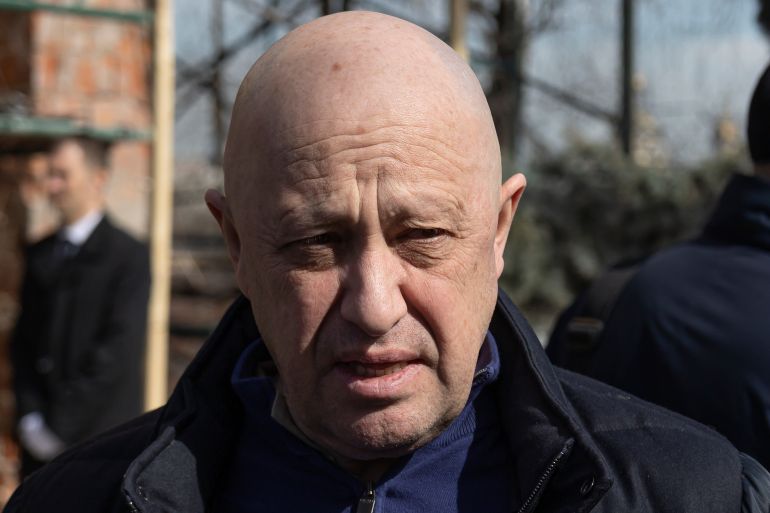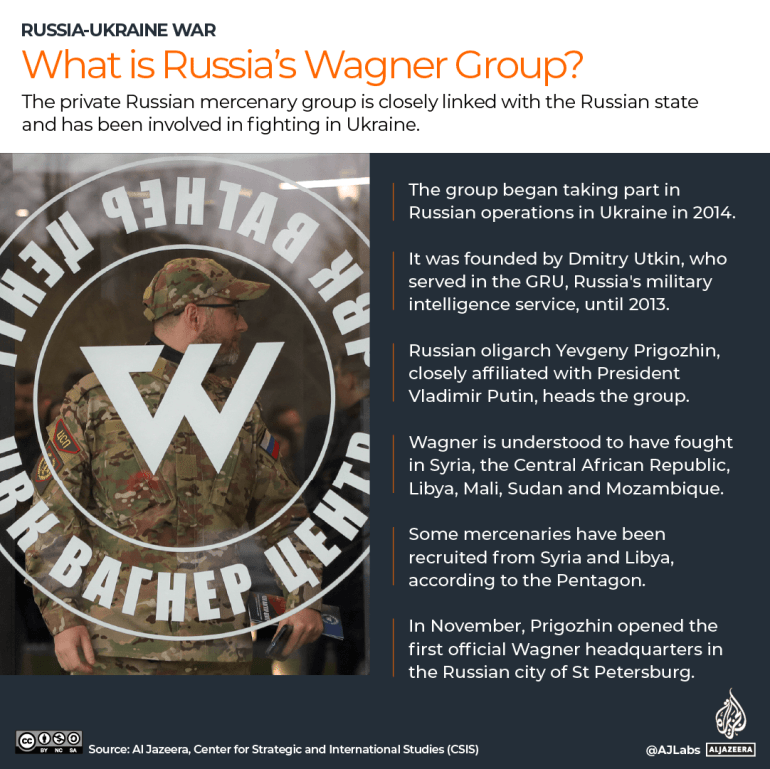Who is Yevgeny Prigozhin, Wagner boss on passenger list of crashed plane?
Once known as ‘Putin’s chef’, Yevgeny Prigozhin rose to prominence after mercenaries from his Wagner Group played a role in the Ukraine war.

Yevgeny Prigozhin, the head of the Russian Wagner Group mercenary force, was listed as a passenger on a private jet which crashed north of Moscow on Wednesday, Russia’s state-owned TASS news agency has reported, citing Rosaviatsia, Russia’s aviation authority.
Prigozhin rose to prominence after taking an increasingly visible role in the war in Ukraine, where his mercenaries were fighting on behalf of Moscow after regular troops suffered heavy attrition and lost territory in humiliating setbacks.
Keep reading
list of 4 itemsRussia pushes into Ukraine’s Kharkiv as Putin announces China trip
US promises Ukraine military aid to make ‘real difference’ on the way
Russia-Ukraine war: List of key events, day 810
Wagner troops raised a Russian flag in the eastern Ukrainian city of Bakhmut in April after a long and bloody battle, bagging a badly needed victory in the 15-month conflict.
Prigozhin turned that moment of triumph into an opportunity just days later to accuse Russia’s military top brass of being responsible for the failures in Ukraine, something only a select few can do publicly without drawing retribution from the Kremlin.
The running feud with the defence ministry reached new heights in June when the Wagner leader claimed his fighters had crossed from Ukraine into the Russian border city of Rostov-on-Don – and that they would fight anyone who tried to stop them.
The Wagner chief has also questioned the official Kremlin version of why Russia invaded Ukraine.
“The defence ministry is trying to deceive society and the president and tell us a story about how there was crazy aggression from Ukraine and that they were planning to attack us with the whole of NATO,” Prigozhin said in a video clip released on Telegram by his press service at the time.
In an emergency televised address, Russian President Vladimir Putin said that the “armed mutiny” by Wagner amounted to treason and that anyone who had taken up arms against the Russian military would be punished.
The revolt was defused in a deal whereby the Kremlin said that in order to avert bloodshed, Prigozhin and some of his fighters would leave for Belarus and a criminal case against him for armed mutiny would be dropped.
Confusion has surrounded the implementation of the deal and the future of Prigozhin. The Kremlin said he attended a meeting with Putin five days after the mutiny. On July 5, state television said an investigation against him was still being pursued, and broadcast footage showing cash, passports, weapons and other items it said were seized on a raid on one of his properties.
But in late July, Prigozhin was photographed in St Petersburg while a Russia-Africa summit was taking place in the city. This week he appeared in a video which he suggested was shot in Africa, where Wagner has operations in several countries.

What is Prigozhin’s background?
Prigozhin, 62, was convicted of robbery and assault in 1981 and sentenced to 12 years in prison. Following his release, he opened a restaurant business in Saint Petersburg in the 1990s.
It was in this capacity that he got to know Putin, then the city’s deputy mayor.
He used that connection to develop a catering business and won lucrative Russian government contracts that earned him the nickname, “Putin’s chef”. He later expanded into other areas, including media and an infamous internet “troll factory” that led to his indictment in the US for meddling in the 2016 presidential election.
In January, Prigozhin acknowledged founding, leading and financing the shadowy Wagner company.
He said he had 50,000 men at his disposal “in the best times,” with about 35,000 on the front lines at all times. He did not say whether these numbers included convicts, but he is known to have toured Russian prisons to recruit fighters, promising pardons if they survived a half-year tour of front-line duty with Wagner.
Why did Prigozhin rise to prominence?
Prigozhin’s scarred face, tightly shaven head and uneven tobacco-stained teeth have become widely recognised, as is his vocabulary filled with expletives.
Polls suggest he has become the fifth most recognisable figure after Putin, Prime Minister Mikhail Mishustin, Foreign Minister Sergey Lavrov and Defence Minister Sergei Shoigu.
He staked out a political niche among conservative Russians who revere Soviet leader Joseph Stalin and want to win the war in Ukraine, no matter what.
“Comrade Stalin was absolutely right,” Prigozhin said in May, touting the death penalty for servicemen and officials who “fail” to support the faltering war effort.
Such a law would be similar to Stalin’s WWII policies.
Prigozhin also said that after losing tens of thousands of mercenaries in eastern Ukraine, his Wagner Group will have to recruit more people and “transform into an army with an ideology”.
To some outside observers, Prigozhin’s transformation may be part of the Kremlin’s power transfer plan in case of a collapse similar to the “Times of Troubles” between the death of Tsar Ivan the Terrible and the ascension of the Romanov dynasty four centuries ago.
What is the Wagner Group?
Prigozhin’s company was called Wagner after the nickname of its first commander, Dmitry Utkin, a retired lieutenant colonel of the Russian military’s special forces. It soon established a reputation for brutality and ruthlessness.
Wagner was first seen in action in eastern Ukraine soon after a separatist conflict erupted there in April 2014, in the weeks following Russia’s annexation of Ukraine’s Crimean peninsula.
While backing the separatist uprising in the Donbas, Ukraine’s eastern industrial heartland, Russia denied sending its own weapons and troops there, despite ample evidence to the contrary. Engaging private contractors in the fighting allowed Moscow to maintain a degree of deniability.
Wagner personnel also deployed to Syria, where Russia supported President Bashar al-Assad’s government in a war. In Libya, they fought alongside the forces of renegade commander Khalifa Haftar. The group is also believed to operate in the Central African Republic and Mali.
Prigozhin has reportedly used Wagner’s deployment to Syria and African countries to secure lucrative mining contracts. US Under Secretary of State Victoria Nuland said in January the company was using its access to gold and other resources in Africa to fund operations in Ukraine.
Some Russian media alleged that Wagner was involved in the 2018 killings of three Russian journalists in the Central African Republic who were investigating the group’s activities. The slayings remain unsolved.
Why has Wagner been accused of human rights abuses?
Western countries and United Nations experts have accused Wagner mercenaries of human rights abuses throughout Africa, including in the Central African Republic, Libya and Mali.
In 2021, the European Union accused the group of “serious human rights abuses, including torture and extrajudicial, summary or arbitrary executions and killings,” and of carrying out “destabilising activities” in the Central African Republic, Libya, Syria and Ukraine.
Several videos have surfaced purporting to show some of the activities that have contributed to Wagner’s fearsome reputation.
A 2017 online video showed a group of armed people, reportedly Wagner contractors, torturing a Syrian and beating him to death with a sledgehammer before mutilating and burning his body. Russian authorities ignored requests by the media and rights activists to investigate.
In 2022, another video showed a former Wagner contractor beaten to death with a sledgehammer after he allegedly fled to the Ukrainian side and was repatriated. Despite public outrage and demands for an investigation, the Kremlin turned a blind eye.